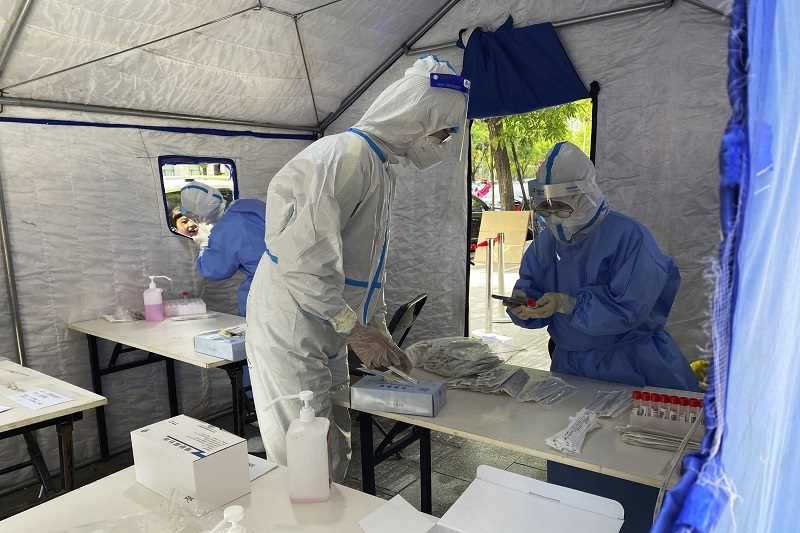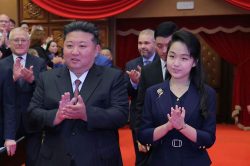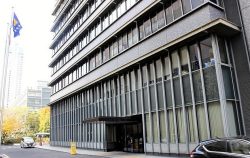
Workers in protective overalls conduct mass COVID testing for residents on Wednesday, May 11, 2022, in Beijing.
15:52 JST, May 11, 2022
BEIJING (AP) — Shanghai reaffirmed China’s strict “zero-COVID” approach to pandemic control Wednesday, a day after the head of the World Health Organization said that was not sustainable and urged China to change strategies.
While China’s largest city has seen progress in controlling the COVID-19 outbreak, any relaxation in prevention and control measures could allow it to rebound, deputy director of Shanghai’s Center for Disease Control Wu Huanyu told reporters.
“At the same time, now is also the most difficult and critical moment for our city to achieve zero-COVID,” Wu said at a daily briefing.
“Should we relax our vigilance, the epidemic may rebound, so it is necessary to persistently implement the prevention and control work without relaxing,” he said.
Wu gave no indication he was aware of the comments by WHO Director-General Tedros Adhanom Ghebreyesus, who said he had been holding discussions with Chinese experts on the need to transition to a new approach in light of new knowledge about the virus.
“When we talk about the ‘zero-COVID,’ we don’t think that it’s sustainable, considering the behavior of the virus now and what we anticipate in the future,” Tedros said at a news briefing Tuesday.
“And especially when we have now a good knowledge, understanding of the virus and when we have good tools to use, transitioning to another strategy will be very important,” he said.
Tedros was joined by Mike Ryan, the WHO’s emergencies chief, who said all pandemic control actions should “show due respect to individual and human rights.”
Countries need to “balance the control measures, the impact on society, the impact on the economy. That is not always an easy calibration to make,” Ryan said.
China’s ruling Communist Party has strictly controlled all discussion about its controversial approach, which aims to totally stamp out outbreaks, and said it would tolerate no criticism. The entirely state-controlled media did not report on the comments by Tedros and Ryan and references to them on the Chinese internet appeared to have been removed by censors.
The ruthless and often chaotic implementation of zero-COVID has stirred considerable resentment in Shanghai, where some residents have been under lockdown for more than a month. As of Wednesday, more than 2 million people in the city remained confined to their residential compounds, while restrictions had been slightly relaxed for most of the other 23 million.
However, the easing appears to now be on hold, even as the number of new cases falls in the city that is home to China’s busiest port, main stock market and thousands of Chinese and foreign firms.
Teams in white protective suits have begun entering the homes of infected people to spray disinfectant, prompting worries about damage to property. Residents have in some cases been ordered to leave their keys with a community volunteer when they are taken to quarantine so disinfectant workers can get in, a new requirement that has no apparent legal basis.
People in some areas have been ordered to stay home again after having been let out for limited shopping in recent weeks. On Tuesday, service was suspended on the last two subway lines that were still operating.
Complaints have centered on shortages of food and other daily necessities and the forced removal of thousands of people to quarantine centers after having tested positive or having been in contact with an infected person, standard procedure in China’s zero-COVID approach.
Along with the human cost, the adherence to “zero-COVID” as many other countries loosen restrictions and try to live with the virus is exacting a growing economic toll.
However, the party under leader Xi Jinping shows no sign of backing off amid efforts to ensure stability and shore up its authority ahead of a major party congress this fall.
Chinese experts such as Wu have been careful to toe the party line, saying the strategy has been effective in limiting the official death toll to slightly over 5,000 over the course of the entire pandemic, according to the government’s National Health Commission, and that any let-up risks sparking a major new surge.
Ryan gave China’s death toll as just over 15,000 and the Johns Hopkins University of Medicine Coronavirus Resource center offers a figure of 14,538.
The daily number of new cases in Shanghai reported on Wednesday had fallen to less than 1,500, down from a peak of 26,000 in mid-April. Seven more COVID-19-related deaths were reported, raising the toll from the outbreak to 560.
While China says more than 88% of its population is fully vaccinated, the rate is considerably lower among the vulnerable elderly. Questions have also been raised about the efficacy of Chinese-produced vaccines compared to those from Europe and the United States.
In the capital Beijing, residents have been ordered to undergo mass testing in a bid to prevent a major outbreak like that in Shanghai. The city, which reported 37 new cases on Wednesday, has locked down individual buildings and residential compounds, shut about 60 subway stations and banned dining at restaurants, allowing only takeout and delivery.
Top Articles in News Services
-

Prudential Life Expected to Face Inspection over Fraud
-

Hong Kong Ex-Publisher Jimmy Lai’s Sentence Raises International Outcry as China Defends It
-

Japan’s Nikkei Stock Average Touches 58,000 as Yen, Jgbs Rally on Election Fallout (UPDATE 1)
-

Trump Names Former Federal Reserve Governor Warsh as the Next Fed Chair, Replacing Powell
-

Suzuki Overtakes Nissan as Japan’s Third‑Largest Automaker in 2025
JN ACCESS RANKING
-

Japan Institute to Use Domestic Commercial Optical Lattice Clock to Set Japan Standard Time
-

Israeli Ambassador to Japan Speaks about Japan’s Role in the Reconstruction of Gaza
-

Man Infected with Measles May Have Come in Contact with Many People in Tokyo, Went to Store, Restaurant Around When Symptoms Emerged
-

Prudential Life Insurance Plans to Fully Compensate for Damages Caused by Fraudulent Actions Without Waiting for Third-Party Committee Review
-

Woman with Measles Visited Hospital in Tokyo Multiple Times Before Being Diagnosed with Disease























